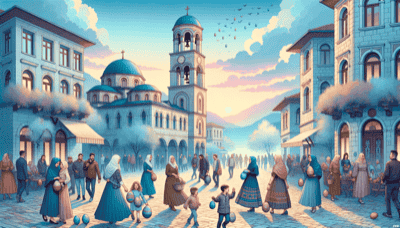We're here to help you keep count of the days to or since a date. Just click the button below and enter your chosen date to get started. Also choose the suggested days or search for a special day above #countingthedays

Easter Sunday in Albania is a significant religious holiday for the Christian community, especially among the Catholic and Orthodox denominations, which are the two main Christian groups in the country. Although Albania is a secular state with a diverse religious composition that includes Muslims, Christians, and others, Easter is celebrated by many with various customs and traditions.
The history of Easter in Albania is intertwined with the history of Christianity in the region. As in other countries, it commemorates the resurrection of Jesus Christ from the dead. Due to historical fluctuations between periods of religious freedom and suppression—especially during communist rule when religion was banned—Easter traditions have experienced both revival and decline over time.
Today, traditional practices have been restored and are observed by many faithful. These include:
Church Services: Many Albanians attend special church services on Easter Sunday. Catholic Albanians may celebrate Mass, while Orthodox Christians participate in the Divine Liturgy.
Lighting Candles: It's common to light candles during these services as a symbol of Jesus Christ as the light of the world.
Red Eggs: A common tradition is dyeing eggs red to symbolize the blood of Christ. These eggs are often cracked against each other to see whose egg will remain unbroken, symbolizing victory over death.
Greeting: The traditional Easter greeting in Albania is "Krishti u Ngjall!" for Orthodox Christians and "Gëzuar Pashkët!" for Catholics, meaning "Christ is Risen!" and "Happy Easter!" respectively.
On Easter Sunday, activities typically revolve around family gatherings and festive meals. It's a day marked by joyous celebrations that include:
Feasting: Families prepare special meals that may include lamb or goat dishes as a central component alongside other traditional foods.
Exchanging Gifts: It's customary for people to exchange small gifts or tokens like painted eggs or chocolates.
Community Events: In some areas, there might be parades or community events celebrating Easter traditions.
While not all Albanians celebrate Easter due to the religious diversity of the country, for those who do, it remains an important time of reflection and joyous celebration that brings together families and communities.